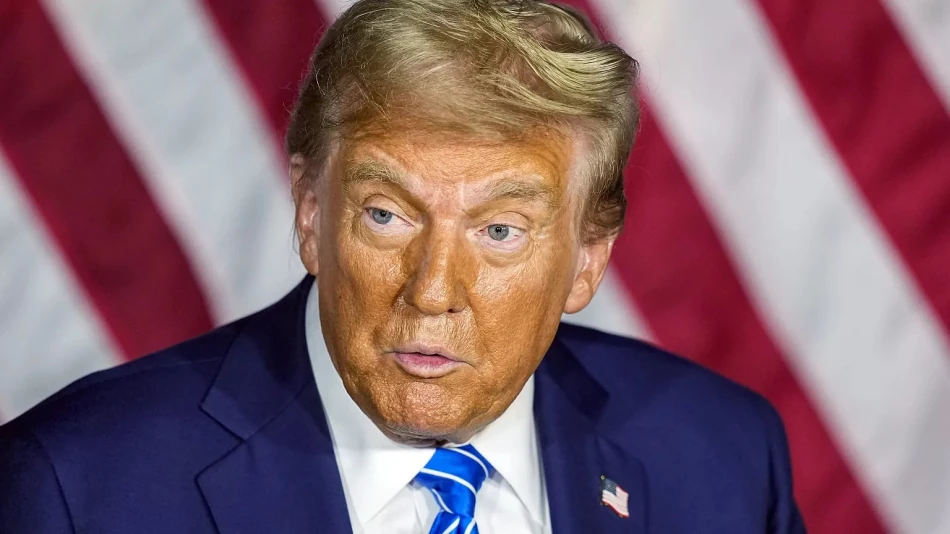
Trump Threatens Steep Tariff Hike on India Over Russian Oil Purchases
Trump Threatens Major Tariff Hike on India Over Russian Oil Trade
President Donald Trump announced Monday he will significantly increase tariffs on India, accusing the country of profiting from Russian oil purchases while ignoring the humanitarian crisis in Ukraine. The move escalates trade tensions with the world's fifth-largest economy and highlights the complex geopolitical challenges surrounding energy sanctions against Moscow.
India's Strategic Oil Gambit Under Fire
Trump criticized India's dual role as both a major buyer and reseller of Russian crude oil on his Truth Social platform. "India doesn't just buy massive amounts of Russian oil, but also sells a large portion of it in the open market for huge profits," Trump wrote. "They don't care how many people are killed in Ukraine by the Russian war machine."
The president had previously threatened a 25% tariff on Indian goods last week, along with unspecified additional penalties. Two Indian government sources told Reuters that New Delhi plans to continue purchasing Russian oil despite Trump's threats, signaling a potential standoff between the two nations.
How India Became Russia's Lifeline
India's transformation into one of Russia's most crucial oil customers represents one of the most significant unintended consequences of Western sanctions. When the U.S. and European allies imposed sweeping energy restrictions on Moscow following the Ukraine invasion three years ago, Russia was forced to offer steep discounts to non-sanctioning buyers.
India seized this opportunity aggressively. While Western nations slashed or eliminated Russian energy imports, India dramatically increased its purchases, capitalizing on discounted prices that sometimes traded $20-30 below international benchmarks. This strategy has saved India billions in energy costs while providing Moscow with crucial revenue streams.
The Refining and Resale Strategy
India's approach goes beyond simple consumption. The country has leveraged its substantial refining capacity to process Russian crude and export refined products to global markets, including potentially back to Western nations. This practice, while not technically violating sanctions, undermines their intended economic impact on Russia.
Market and Geopolitical Implications
Trump's tariff threat creates a complex three-way tension between economic pragmatism, geopolitical alignment, and trade relationships. For India, Russian oil imports have been an economic windfall during a period of high global energy prices, supporting the country's growth trajectory and energy security.
From a market perspective, any disruption to India's Russian oil trade could ripple through global energy markets. India processes approximately 2 million barrels per day of Russian crude, making it Moscow's second-largest oil customer after China. A forced reduction could tighten global supply and potentially drive up prices.
Comparing Global Responses
India's position contrasts sharply with other major economies. While the UAE and Singapore have maintained more cautious approaches to Russian energy, India has embraced the opportunity with little regard for Western diplomatic pressure. China, similarly, has increased Russian energy imports, but India's rapid transformation from minimal to massive buyer stands out.
Unlike during previous sanctions regimes, where countries like Turkey or Iran faced sustained pressure for sanctions-busting, India's large economy and strategic importance have largely shielded it from serious consequences—until now.
The Economic Reality Check
Trump's tariff threat forces India to weigh the benefits of discounted Russian oil against potential losses in its crucial U.S. trade relationship. Bilateral trade between the countries exceeded $190 billion in 2023, making America one of India's largest trading partners. A 25% tariff on Indian goods could significantly impact key export sectors including textiles, pharmaceuticals, and information technology services.
However, India's energy import bill—historically one of its largest economic burdens—has been substantially reduced through Russian purchases. The savings may provide enough economic cushion to absorb increased tariff costs, at least in the short term.
This confrontation will test whether America's economic leverage can override India's energy pragmatism, setting important precedents for how sanctions enforcement evolves in an increasingly multipolar global economy.
Most Viewed News

 Sara Khaled
Sara Khaled






